Page last updated: August 3, 2021
All pages copyright © 2021 by Pinyon Publishing

OCCUPIED:
Vienna is a Broken Man & Daughter of Hunger
Poems by Kika Dorsey
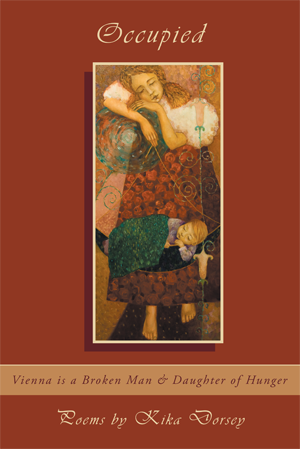
In Kika Dorsey’s newest book of poetry, Occupied: Vienna is a Broken Man and Daughter of Hunger, the reader encounters a landscape ravaged by war and joins a cast of survivors. “Paint me, Mother,” Dorsey writes, “find me in the basement rummaging through everything I thought/I’d never find—” speaks to how the poet first conceived this project. While inspired by the stories of her own Austrian ancestry, Dorsey broke from her generally more autobiographical tradition seen in past works (Beside Herself, Coming Up for Air, and Rust) by taking a more erudite approach. Flexing her academic muscles Dorsey dives into her research to then deliver an ensemble of characters she crafted from history and her imagination.
These girls and women diversify the experience as their stories parallel the stories of Dorsey’s matriarchs as they all rise up to fend for themselves during the war and after. While some of these women have fallen from aristocracy, some of them were always poor; there are Jewish women who did and did not survive and there are women who carry the seed of their rapists.
Occupied almost reads like a novel as the vignettes present the opportunity for us to vicariously experience the lives portrayed upon these pages. We bear witness as these characters barter with the soldiers who occupy the land; as they forage the woods for mushrooms and berries to combat hunger; as they disguise their gender on more than one occasion to avoid sexual assault. These poems speak to the evils of war, focusing specifically on those realities women and children face, and these poems beg, “Never again!”
If you’re a fan of Maggie Smith’s glittering details, you’ll love Dorsey’s descriptions too: there are “eyes big and black as an eclipsed moon,” “silhouettes like shadows,” and “Monkshood is why witches traverse the sky on brooms.” But there is also always her extraordinary use of color, whether it’s “rivers of veins blue-green like the Danube” or the red of “raspberries sprinkled with sugar.”
If you appreciate storytelling poets such as Ai or Marsha De La O, Occupied must be next on your To Read List.
As brutal as the topic is, herbs sprout forth from the rubble, and as our healer, Dorsey turns them into medicine; furthermore, the “hope for spring” repeats throughout as Dorsey reminds us the darkest hour is just before the dawn, and she teaches us how to resurrect from ruin.
–SARAH ELIZABETH SCHANTZ, author of the novel Fig
In Occupied, Kika Dorsey wades in the troubled waters of two times on two continents, but the stories are linked through desperation, survival, blood. With her gift of precise detail—monkshood, Klimt’s gold, cognac and marbles—and her storytelling prowess, Dorsey’s poems offer us the bite of the cold and the shadows of the world, and remind us of the need to be sharp, to keep our eyes wide open. These are poems to break your heart, and also an homage to how, despite great sorrow, injustice, and fear, we find a way forward.
–ROSEMERRY WAHTOLA TROMMER
Author of Hush, Naked for Tea and Even Now
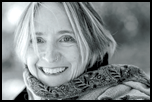 Kika Dorsey is a poet and fiction writer in Boulder, Colorado and lives with her two children, husband, and pets. Her books include a chapbook Beside Herself (Flutter Press, 2010) and two previous full-length collections, Rust and Coming Up for Air (Word Tech Editions, 2016, 2018). She has been nominated for the Pushcart Prize four times. Currently, she is an instructor of English at Front Range Community College and works as a writing coach and ghostwriter, and in her free time, she swims miles in pools and runs and hikes in the open space of Colorado’s mountains and plains. www.kikadorsey.com
Kika Dorsey is a poet and fiction writer in Boulder, Colorado and lives with her two children, husband, and pets. Her books include a chapbook Beside Herself (Flutter Press, 2010) and two previous full-length collections, Rust and Coming Up for Air (Word Tech Editions, 2016, 2018). She has been nominated for the Pushcart Prize four times. Currently, she is an instructor of English at Front Range Community College and works as a writing coach and ghostwriter, and in her free time, she swims miles in pools and runs and hikes in the open space of Colorado’s mountains and plains. www.kikadorsey.com
Poems are voices in Kika Dorsey’s Occupied: Vienna is a Broken Man and Daughter of Hunger. Voices of her mother speaking through this daughter’s voice, further voicing her own parents, all swept together into a multi-generational voice, recalling a devastation that was WWII and its aftermath. Voices of a mother’s memories of foraging for food in post-war gnawing hunger. Voices of a daughter’s thirst to give her mother’s ashes voice. A daughter’s neoteric voice as it joins their rise in unfolding lyric. A powerful cohesion of voices.
–MAUREEN OWEN
Kika Dorsey’s essential collection of superbly composed poems deals with WW II, the postwar years in Austria, once home of her parents, and traumatic experiences, mainly those of her mother then a very young child. The stark poems show an amazing suction which draws you immediately in crucial stories till our present, visceral descriptions, which remind me vividly of my own postwar experiences in Germany, vigorous in diction with an elemental power. Voices of her mother and other persons tell stories, memories, illuminating years of violence, hardship and extreme hunger, “My hollow belly” taught a child how to survive by gathering wild foods which might be the wrong one like poisonous mushrooms. “I caught my daughter / chewing the leg of my lederhosen,” says grandmother in one of the poems. (How could we laugh at Charlie Chaplin`s scene when eating leather shoe-laces like spaghettis.)
Traumatic experiences in childhood are inscribed in a fast epigenetic process with effects on future generations. “Roots survive” says the author thinking not only of her parent’s shattered childhood, shattered as the body of her father on cobblestones and shattered as her mother’s mind when she developed Alzheimer’s: “My mind is a handful of crumbs.”
Kika Dorsey wanted to know more about her parents, about collective human failings in WWII, hunger, plight and the effects on human souls when having gone through years of extreme psychic stress. Her research back to the roots—a net overriding which shows us how deeply interwoven we all are, everywhere in this world—has led her to a better, deeply empathetic understanding, a way to oneself as well and a chance of transformation which “leads to hope and care for a fragile future”.
–UTE VON FUNCKE
Author of four poetry collections in German, and author of two poetry collections, chosen and translated into the English by Stuart Friebert, “Between Question & Answer”, 2018, Pinyon Press and “Shadow of Shadows”, late spring 2020, Black Mountain Press“. “Make love not war” was the cry of her generation.
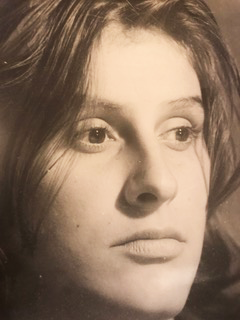
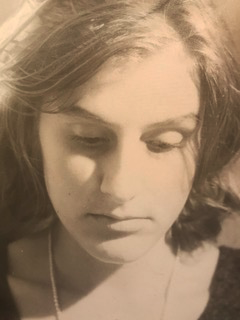
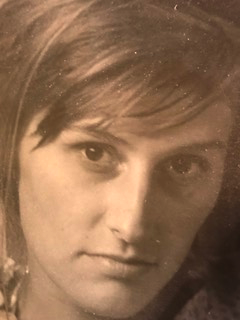
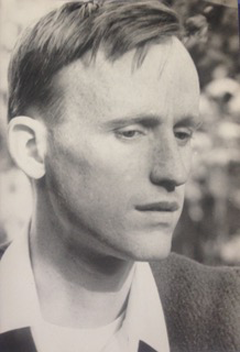
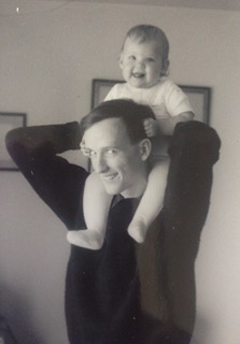
Kika’s Mother and Father
September 30, 2020: Conversation with Kika Dorsey—The Voice of a Poet
“In my collection of poetry Occupied: Vienna is a Broken Man and Daughter of Hunger, I explore the time period in which my mother grew up in post-WW2 Austria …” Read here.
November 10, 2020: Kika Dorsey at the Jaipur Literature Festival
Tuesday Nov 10, 6:15-6:45 (Mountain Time), Kika Dorsey will be reading with Native American fiction and poetry writer, Erika Wurth. They’ll be talking about cultural trauma, legacy, and memory. Register for FREE here.
July 2021: Kika Dorsey’s Occupied is the 1st Place Winner of the Colorado Authors’ League Poetry Collection Award
Page last updated: August 3, 2021
All pages copyright © 2021 by Pinyon Publishing

